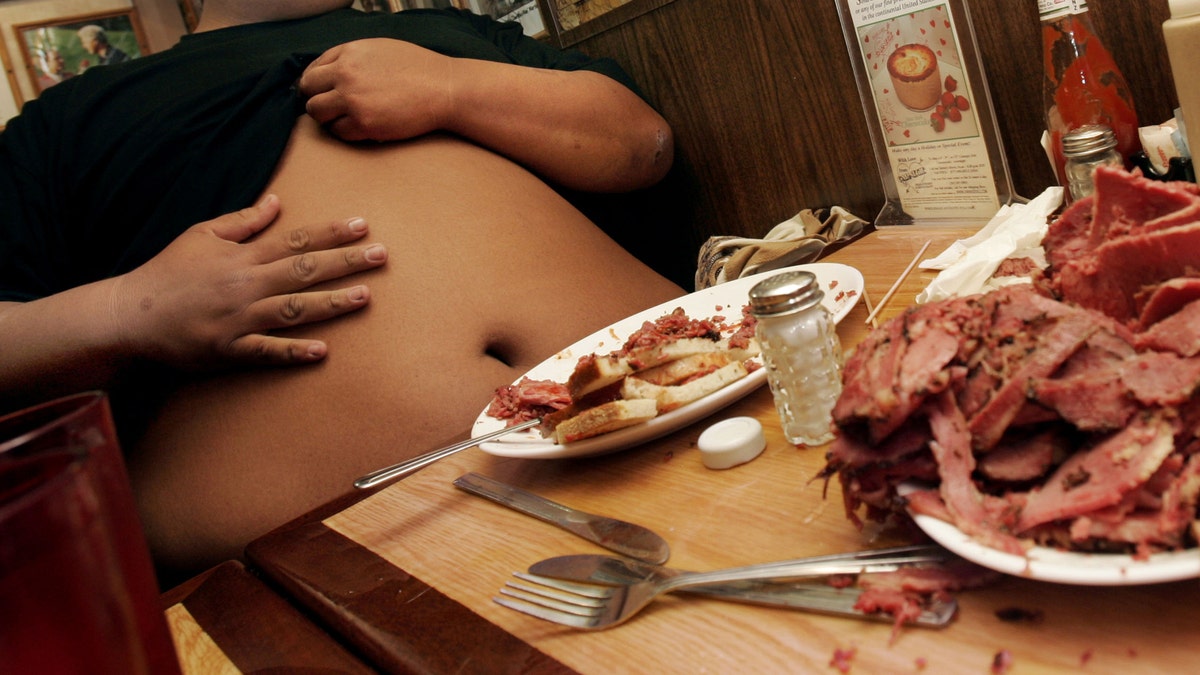
Harrington Wa, from Hauula, Hawaii, rubs his stomach as he takes a break while eating lunch with other Sumo wrestlers at New York's Carnegie Deli, Tuesday Oct. 18, 2005. They are participating in the "World S.U.M.O. Challenge - Battle of the Giants" at New York's Madison Square Garden Saturday Oct. 22, 2005. (AP Photo/Richard Drew) (AP)
We’ve all gone through stomach problems at one time—that fullness sensation accompanied by a gaseous feeling, the need to burp and/or pass gas, or even an abdominal distension known as a hard stomach.
It’s commonly referred to as “feeling bloated,” and it is more common than you might think. Up to 35 percent of the general population reports a bloating symptom, according to an Alimentary Pharmacology & Therapeutics study. And drugstores now are flooded with belly-friendly drugs to prevent the painful and not-weight-friendly bloating feeling.
What causes our belly to swell like a balloon? Blame the gluten in your bread, chronic constipation, PMS, or even everyday stress. Some diseases like irritable bowel syndrome (IBS) also have bloating as a main symptom.
But before you reach for another Gas-X chewable tablets, you should know these interesting facts about that uncomfortable feeling, from the creator of F-Factor Diet, Tanya Zuckerbrot, M.S., R.D., a high-fiber nutrition and weight-loss program.
Does one gender experience bloated-ness more than the other? If so why?
More women experience bloating than men. For many women bloating may be a symptom of PMS and /or occur during their periods when they retain water due to a rise in estrogen levels. In women, decreased estrogen levels can also cause bloating because it decreases the amount of bile that is produced by the liver. Bile aids in digestion by emulsifying fats from the foods we eat, and bile acts as a lubricant for the small intestine, which helps overall digestion.
What are the culprits to bloated-ness?
Certain foods can cause bloating: Fatty foods cause delayed gastric emptying; cruciferous vegetables, such as broccoli, Brussels sprouts, cauliflower and cabbage; carbonated drinks; chewing gum; hard candy; the artificial sweetener Sorbitol, which some people have difficulty digesting; beans, which contain oligosaccharide, a carbohydrate that is resistant to digestion and causes flatulence and gas. Other foods that may promote bloating include: milk products, gluten, and foods high in sodium, such as canned foods, salted nuts, potato chips, and frozen dinners. Lifestyle and eating behaviors also can cause bloating. Eating too fast, eating a big meal late in the day, dehydration, lack of exercise, stress and anxiety, may all promote bloating. Resisting trips to the bathroom may also be a factor, too, because holding in bowel movements can lead to bloating and constipation.
Is there any food or drink that helps to alleviate the feeling?
- Eating more fiber will help alleviate bloating. When increasing your fiber intake it’s important to do it gradually and to drink plenty of water. If you previously had a diet that was low in fiber and then significantly increase your fiber intake, you may initially experience some bloating. Once your body adjusts, however, you should experience less bloating, water retention, and abdominal discomfort.
- Drink more water. Water also helps decrease water retention, which we know is a cause of bloating. It helps soften high-fiber foods, and create a softer stool, preventing constipation and irregularity. Water also helps decrease water retention, which we know causes bloating.
- Foods high in potassium help combat bloat. Sodium causes water retention and bloating, however, potassium counterbalances sodium and has a diuretic effect on your body. So by eating foods high in potassium—like oranges, bananas, papayas, kiwis, strawberries, spinach, watercress, and cooked beets—you can reduce bloating naturally.
- Foods with probiotics can help alleviate bloating: For example, fermented cultured dairy products, such as yogurt, kefir, dahi, and buttermilk, fermented cheeses, and soy products like miso and tempeh. Other foods that aid digestion include: Fennel, dill, cilantro, basil, mint, chervil, parsley, peppermint, ginger sage, rosemary, and thyme.
What drugs can work?
Over the counter medication are good for gas, acid reflux, and belching, but if you are constipated it’s better to take a natural vegetable stool softener rather than laxatives, which can weaken the muscles of your digestive system and may be habit forming.
Is a “detox” diet recommended?
Adding fiber to your diet is a natural way to detox your body while alleviating bloating promoting regularity. Many detox diets are based on juices or fasts, which do the opposite of what your body needs to reduce bloating. Juices from fruits or vegetables no longer have fiber, which is why detox diets can leave you hungry and may produce extreme diarrhea or constipation. If your bloating is caused by certain foods then a detox diet is only a temporary fix. The right approach is to eat a healthy diet while avoiding foods that contribute to bloating and water retention.
Can bisphenol found in so many cans of food have an impact on this sort of inflammation state?
Yes. Many believe bisphenol A, more commonly known as BPA, which is found in plastic bottles and canned goods, can contribute to bloating. BPA has endocrine disrupting chemicals (referred to as obesogens) that leach from food containers into the foods we consume. The obesogens absorbed by the body can disrupt the natural digestion process and cause bloating.
How does exercise help reduce the bloating?
Exercise helps maintain the balance of hormones and enzymes in the body, improve blood circulation, and the functioning of cells and systems. When our body retains water, exercising helps eliminate some of the retained water so there is less bloating. Low-moderate intensity for approximately 30 minutes—where you keep your heart rate relatively steady—is most recommended to prevent bloating.







































